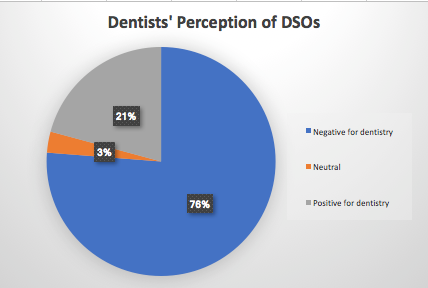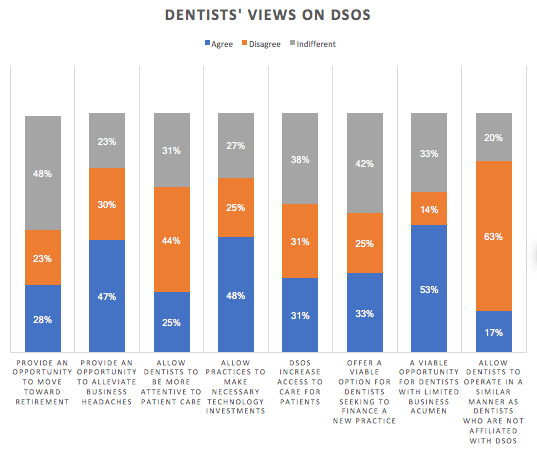Dentists Hold Negative View of DSOs, Survey Shows
A poll of Dentist's Money Digest readers revealed that 77 percent of dentists held negative views of dental service organizations, saying that DSOs hurt dentistry. The news comes at a time when the business of dentistry is at a crossroads, with dentists having to choose between the traditional, small-business model of dentistry and the new, corporate approach of DSOs. DSO proponents say they allow dentists to worry less about the business side of running a practice and focus more on dentistry. Detractors say they are too profit-driven and do not have the patients' best interest at heart.

A new Dentist’s Money Digest® readership poll shows how dentists feel about Dental Service Organizations.
It seems that dental service organizations have an image problem.
A recent Dentist’s Money Digest® readership poll revealed that more than three quarters of surveyed dentists believe that DSOs have a negative impact on the field of dentistry.
Dentist’s Money Digest® distributed the survey to dentists on its electronic mailing lists, circulated the poll on social media, and posted it on its website. To be counted in the survey, participants had to self-identify as dentists. The survey included a sample size of 64 dentists and was intended to glean insights about the perception of DSOs among our readers who are practicing dentists.

Survey respondents were asked to rate their perception of DSOs on a scale of one to seven, with one being negative and seven being positive. The findings:
- 77 percent thought that DSOs had a negative effect on dentistry.
- 21 percent felt that DSOs were positive for dentistry.
- Only 3 percent held a neutral opinion.
In an open-ended portion of the survey, dentists were asked to explain their reasons for disliking DSOs. Some of those reasons included:
- “Less patient relationship value.”
- “They are forcing small business people out of the field because we can’t compete with advertising and other money-pooling gimmicks.”
- “I have worked for a few and they are not patient-focused.”
- “Too much money is directed away from dental care; the patient is not the focus.”
- “Profit before quality.”
The business of dentistry is currently at a crossroads with many dentists having to choose between the traditional, small-business model of dentistry, and partnering with the larger, corporate entities known as DSOs. Both approaches have their advantages, since, as Dentist’s Money Digest® reported in its debut February print edition, the debt load carried by current dental school grads is changing the game.
“You come out of school and you own $300,000 bucks in student loans or more,” Patrick Wood, founder of Wood & Delgado, a dental legal firm in Mission Viejo, California, said in that report. “You can go into the corporate world and right off the bat do fairly well.”
Coupled with that debt load is an unfamiliarity with the skills required to run a dental practice. The survey also looked to determine how prepared dentists are for practice ownership. Using the same one-to-seven scale, with one representing no training and seven representing well-trained, here is what we found:
- 42 percent of surveyed dentists said they received little to no business training.
- 41 percent said they had some training.
- 7 percent said they were well trained.
Corporate dentistry also has its appeal to doctors who are near the end of their career, the same report concluded. Maria G. Melone, CPA, CVA, and partner at MORR Dental Solutions in Wesborough, Massachusetts, told Dentist’s Money Digest® that many dentists are fed up with decades of business “headaches.” Selling their practice to a DSO also has its business advantages.

One of the many arguments for DSOs is that they enable dentists to focus on providing better patient care while worrying less about the business side of running a practice. More than half of respondents — 53 percent – considered DSOs a viable option for dentists with limited business acumen, while only 25 percent said DSOs allow dentists to be more attentive to patient care.
Currently, the American Dental Association estimates that 7.8 percent of dentists are part of a DSO. In the Dentist’s Money Digest® February report, Dave Preble, D.D.S., vice president of the ADA’s practice institute, said the association feels the public is best served by practices that are owned by dentists, though it counts dentists belonging to DSOs or dentists who own DSOs among its members.
“Currently, that’s the only way to have any legitimate oversight on making sure they’re doing the right thing,” Preble said.
The Dentist’s Money Digest® February report also included insights from DSO dentists who refuted the idea that DSOs direct clinical decisions.
“You hear the word ‘quotas’ a lot,” said Lorne Yasbin, D.M.D., of Dental One Associates in Frederick, Maryland. “Like, ‘You have to do this many procedures’ or ‘Why aren’t you doing this?’ I’ve been here for 15 years; I own the practice. All the clinical decisions are made by the clinicians.” There’s never been any input or discussion about clinical decisions from non-clinical personnel, he added.
ACTIVA BioACTIVE Bulk Flow Marks Pulpdent’s First Major Product Release in 4 Years
December 12th 2024Next-generation bulk-fill dental restorative raises the standard of care for bulk-fill procedures by providing natural remineralization support, while also overcoming current bulk-fill limitations.